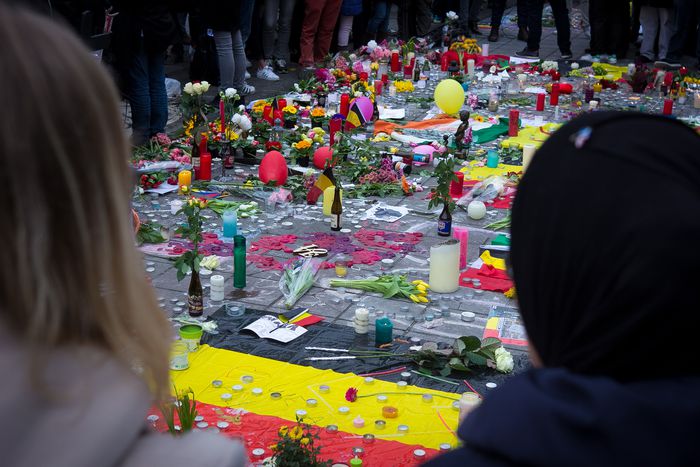
European security: What happens now?
Published on
Translation by:
euro topicsAfter the Brussels attacks the EU's interior ministers have convened for a special meeting to discuss how to respond to the terrorist threat. The exchange of information among European countries must be improved, some commentators urge. Others fear that the data could then end up in the wrong hands.
Pan-European cooperation urgently needed - Le Figaro, France
Bureaucratic obstacles have left Europe vulnerable, the conservative daily Le Figaro criticises: “The EU administrative jungle - 28 capitals with conflicting interests must be jointly accommodated - is no better protected than the Kingdom of Belgium with its four governments. Six police forces are operative in the Belgian capital alone. On the borderless continent, any security loopholes in one country have immediate consequences for the others. Destabilised by the refugee crisis after seven years of economic slump downturn stagnation, Europe most certainly does not need that now. ... The Brits, who are flirting with a Brexit, the French and the Germans, who are tempted by the anti-European far right, have sent a clear message: as opposed to the official credo, the EU is not the solution but the problem. To turn things around after these killings we need more than just an emergency meeting of the interior ministers.” (24/03/2016)
States must share information - La Vanguardia, Spain
Only through international cooperation among police agencies and intelligence services can global terrorism be combatted effectively, the conservative daily La Vanguardia stresses: “Europe can't combat jihadism effectively if its various counter-terrorism services created barely communicate with each other. Not to mention the lack of communication among the different authorities within an individual state (the city of Brussels, for example, has six local police forces and one federal force). The organigram of security is made for a national framework rather than tackling global terrorism, not only as regards the different areas of responsibility but also as regards the very character and mindset of these services, which tend to keep their information and sources to themselves. We should bear in mind how 9/11 exposed the distrust and rivalry between the CIA and the FBI.” (24/03/2016)
Sensitive data could end up in wrong hands - Süddeutsche Zeitung, Germany
Germany's Interior Minister Thomas de Maizière has once again called for improved data exchange in Europe, arguing that security is more important than data protection. But such information can end up in the wrong hands, the centre-left daily Süddeutsche Zeitung warns: “The EU states that have efficient security services are not about to toss their sensitive and valuable data into a 28-state pot if there is a chance that other states will play fast and loose with it. Bearing in mind the current state of the security bureaucracy in various EU states, it cannot be excluded that the most sensitive data would find its way into the hands of organised criminals. And as long as this risk exists a joint counter-terrorism centre for all 28 EU states will remain an illusion. ... One effective interim solution would be for able and willing states in core Europe to set up a small, effective counter-terrorism centre with intensive data exchange.” (24/03/2016)
Have the Belgian authorities failed? - De Standaard, Belgium
According to Turkish President Recep Tayipp Erdoğan one of the Brussels attackers had been detained in Turkey over his ties with the Islamist scene and deported back to Belgium in July 2015. The liberal daily De Standaard finds the fact that the authorities in Europe released him disturbing: “After the Paris attacks the two el-Bakraoui brothers already came under scrutiny. Wasn't it already clear then that one of them, Ibrahim, had basically been presented to the Belgian legal authorities on a platter? Did someone fail to add up the facts or pass on the information? These questions can't be ignored. … More than 30 people have died and more than 200 have been injured. All the other countries are observing the situation with incomprehension and growing anger. How can we maintain that our system worked when there are so many indications pointing in the opposite direction? What will happen when Belgium can no longer deny that it has failed as a state? Who will assume the responsibility for this?” (24/03/2016)
Security measures alone insufficient - Kauppalehti, Finland
Lasting success in the fight against terrorism can only be guaranteed by long-term measures and strategies, the business paper Kauppalehti is convinced: “Clearly terrorism in Europe cannot be defeated only with joint security measures. The real causes of terrorism - of which the Syria war is currently the most acute - must be defeated. The next step is then to take appropriate steps to integrate the immigrants who have come to Europe, because in the poor neighbourhoods of our big cities the seeds for the radicalisation of immigrants are germinating. Security measures are a first step. But terrorism must be tackled at its roots to prevent it from permanently destroying the European lifestyle, European values and the open society.” (24/03/2016)
---
30 Countries, 300 Media Outlets, 1 Press Review. The euro|topics press review presents the issues affecting Europe and reflects the continent's diverse opinions, ideas and moods.
Translated from Sicherheit in Europa: Gemeinsam statt einsam



